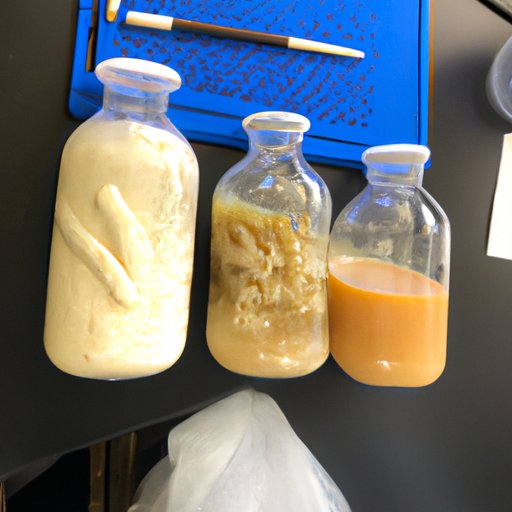Introduction
Fermented foods have been around for thousands of years, with evidence of fermentation dating back to 6000 BC in China. In modern times, many people are turning to fermented foods as a way to add nutrition and beneficial bacteria to their diets. But what exactly are fermented foods and what are the benefits of incorporating them into your diet?

Exploring the Science Behind Fermenting Foods
Fermentation is a process that uses bacteria, fungi, or yeast to convert carbohydrates into alcohol or organic acids. During this process, sugars and starches are broken down into simpler compounds such as ethanol, lactic acid, and acetic acid. This process adds flavor and aroma to food, as well as preserving it by inhibiting the growth of harmful bacteria.
The microbes involved in the fermentation process vary depending on the type of food being fermented. Yeast is often used to ferment breads and alcoholic beverages, while bacteria such as Lactobacillus and Acetobacter are commonly used to ferment dairy products and vegetables. Enzymes such as amylase, protease, and lipase are also involved in the fermentation process, breaking down starches and proteins into simpler compounds.
Fermentation has many nutritional benefits. It increases the bioavailability of certain vitamins and minerals, and can reduce the amount of antinutrients present in some foods. It also increases the levels of beneficial bacteria, which can help improve digestive health. The fermentation process also breaks down complex carbohydrates, making them easier to digest.
How to Incorporate Fermented Foods into Your Diet
There are many different types of fermented foods available, ranging from traditional pickles to modern probiotic drinks. Some of the most popular fermented foods include kombucha, sauerkraut, kimchi, yogurt, and kefir.
When incorporating fermented foods into your diet, it’s important to remember that not all fermented foods are created equal. Choose high-quality products that are made with natural ingredients and free of artificial preservatives and additives. It’s also a good idea to start with small amounts and gradually increase your intake over time.
It’s also important to note that some fermented foods may contain traces of alcohol, so if you’re pregnant or breastfeeding, it’s best to avoid them. Additionally, if you have a weakened immune system or suffer from chronic digestive issues, it’s important to speak to your doctor before adding fermented foods to your diet.

Fermented Foods and Their Impact on Gut Health
Fermented foods are a great source of beneficial bacteria, which can help improve digestive health. These beneficial bacteria can help balance the microflora in the gut, improving digestion and nutrient absorption. They can also help protect against harmful bacteria and viruses, and reduce inflammation in the gastrointestinal tract.
In addition to providing beneficial bacteria, fermented foods can also help promote healthy gut function. Fermented foods contain prebiotics, which act as food for probiotics, helping them to thrive and multiply. Prebiotics can also help stimulate the growth of beneficial bacteria, improving overall gut health.

Comparing Different Types of Fermented Foods
Kombucha is a fermented tea beverage that is made by combining tea, sugar, and a SCOBY (Symbiotic Culture of Bacteria and Yeast). Kombucha is rich in probiotics, antioxidants, and enzymes, and can help boost energy levels and improve digestion.
Sauerkraut is a fermented cabbage dish that is popular in Germany and other parts of Europe. Sauerkraut is rich in probiotics, vitamin C, and fiber, and can help improve digestion and reduce inflammation.
Kimchi is a traditional Korean dish made with fermented vegetables such as cabbage, radishes, and carrots. Kimchi is rich in probiotics, vitamins, and minerals, and can help improve digestion and boost immunity.
Yogurt is a fermented dairy product that is made by combining milk and live cultures. Yogurt is rich in calcium, protein, and probiotics, and can help improve digestion and boost immunity.
Kefir is a fermented dairy drink that is made by combining milk and kefir grains. Kefir is rich in probiotics, calcium, and protein, and can help improve digestion and boost immunity.
Conclusion
Fermented foods can be a great addition to any diet. Not only do they provide beneficial bacteria, but they also offer a variety of vitamins, minerals, and other nutrients. So if you’re looking to improve your gut health or just want to add some extra nutrition to your diet, then consider adding some fermented foods to your daily routine.
(Note: Is this article not meeting your expectations? Do you have knowledge or insights to share? Unlock new opportunities and expand your reach by joining our authors team. Click Registration to join us and share your expertise with our readers.)
